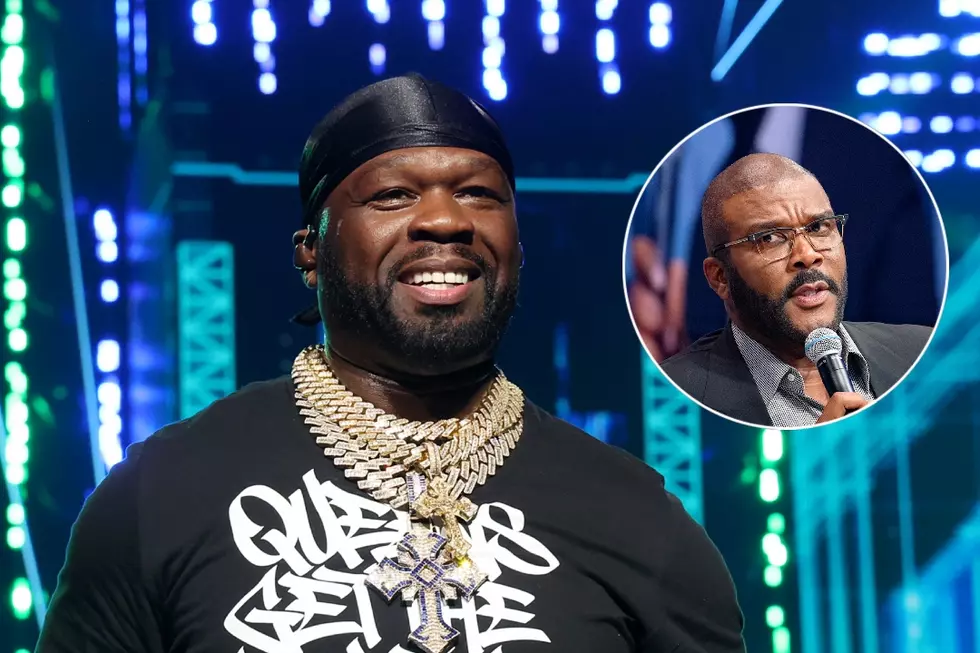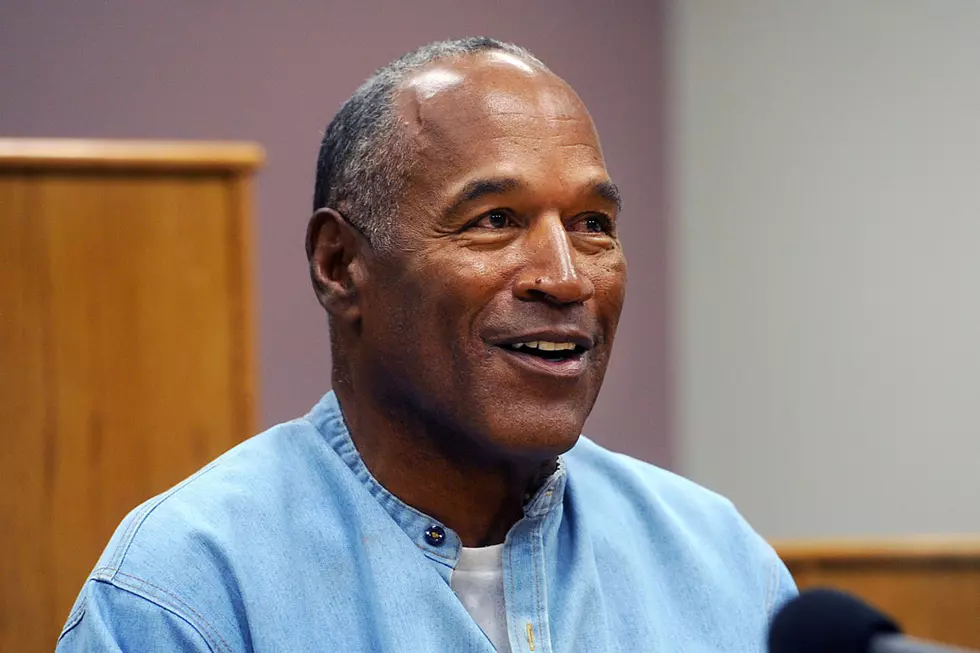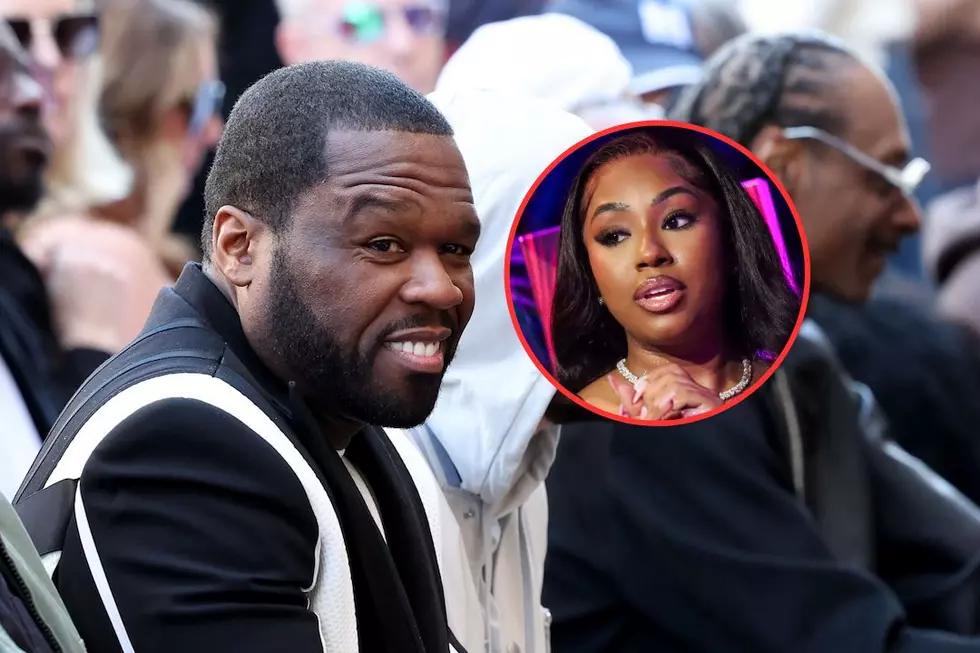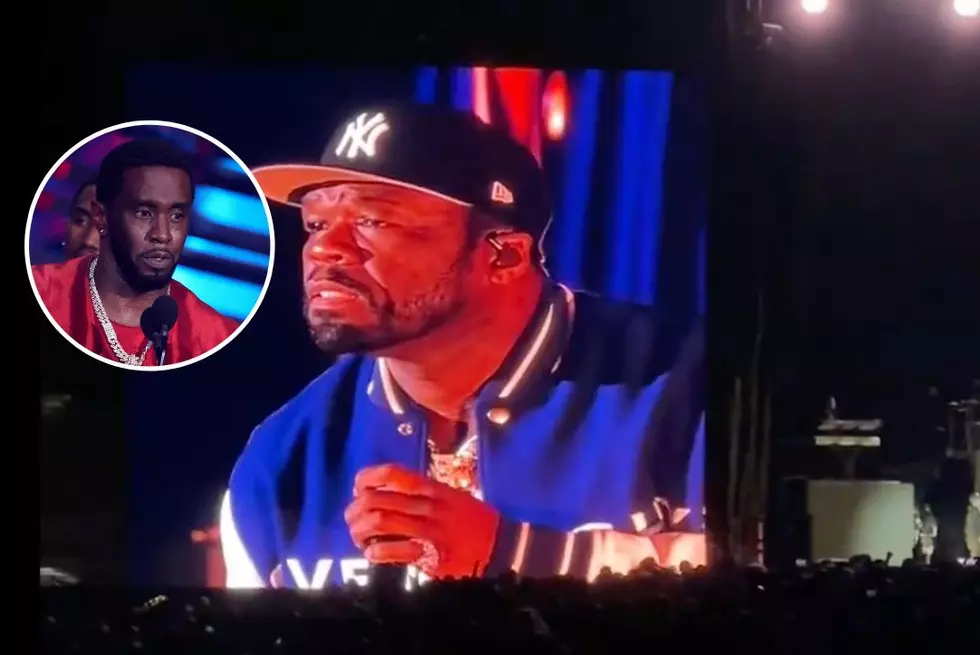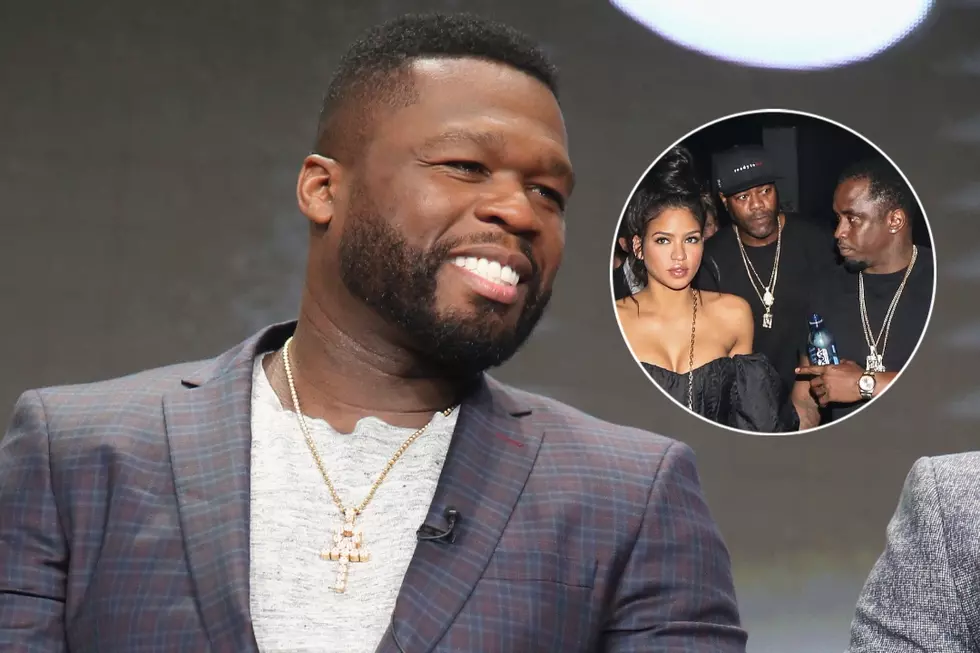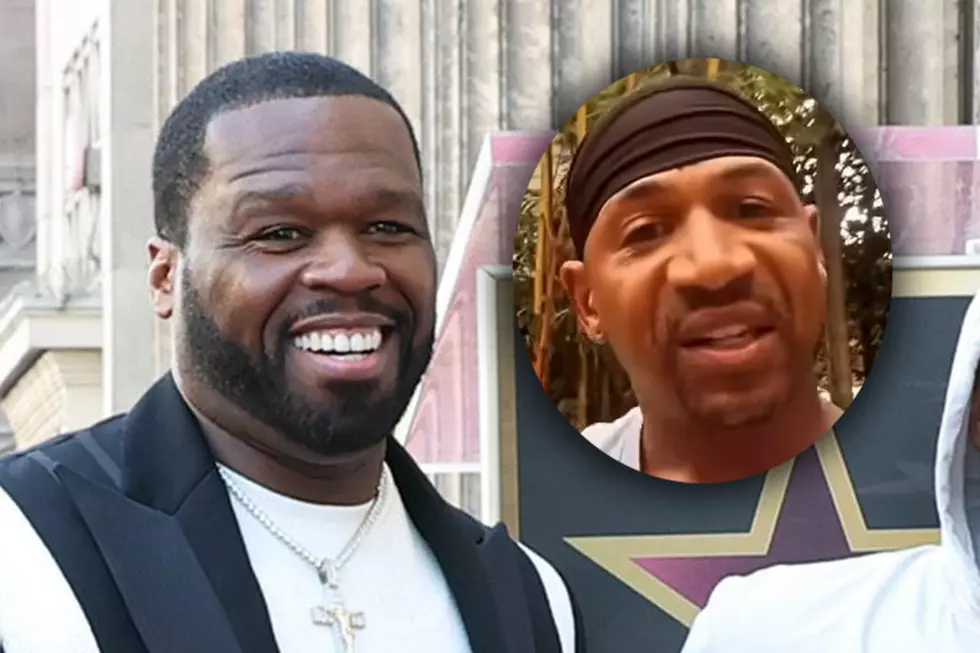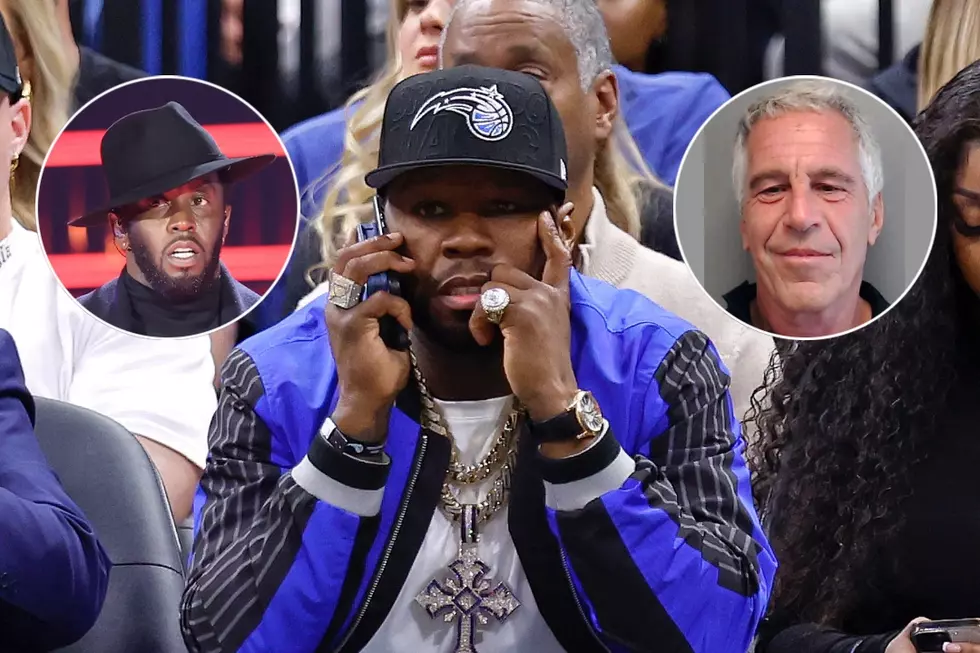FEATURE: 50 Cent: Evolution
[Editor's Note: This interview appears in the January/February 2009 issue of XXL Magazine.]
He was already battle scarred when he arrived on the scene. But, last year, for the first time in half a decade, 50 Cent was truly tested. As he adjusts to a seat somewhere other than the top of the game, is the biggest, baddest, dude in rap singing another tune?
It’s said that men are defined by adversity. And no one knows adversity like Curtis “50 Cent” Jackson. The Southside Jamaica, Queens, native lost his mother to murder at the tender age of eight, spent his teens dealing crack and was a convicted felon by the age of 20. After a promising start at a rap career in the late 1990s, his first album was shelved by Columbia Records. He was shot nine times in May 2000, hospitalized for 13 days (he would be in recovery for nearly five months), only to rise up through New York’s street mixtape scene, crushing a raft of naysayers and rivals, and explode into 2003 as hip-hop’s biggest star.
Building his crew and record label, G-Unit, into an industry powerhouse, expanding his business into sneakers, clothing, video games and, most lucratively, beverages, 50 reigned supreme for years, amassing a fortune estimated to be in the $400-million range. September 2007, though, marked a sea change. When 50 lost a heavily hyped first-week-sales showdown to Kanye West, critics seized the moment to declare the end of an era. Though his album Curtis opened at No. 2, with a strong 700,000 sold, and went on to sell well over a million copies in a depressed music market, the numbers paled in comparison to the massive, multiplatinum successes of his previous two efforts. Things got worse this summer. After going back to their street roots with the modern-day mixtape classic Return of the Body Snatchers, and going at enemies like Fat Joe on the follow-up, Elephant in the Sand, G-Unit’s sophomore album, T.O.S., sold a measly 228,000 copies, 2.4 million fewer than its 2003 predecessor. As he preps his fourth solo shot, Before I Self Destruct, 50, for the first time in five years, is looking to make a comeback.
There have been other disturbances in the empire. On June 16, a YouTube video surfaced of G-Unit member Young Buck performing a solo show in Tampa, Florida. In the clip, Buck, who’d been defying crew doctrine by publicly squashing beef with adversaries like The Game and Jadakiss, emphatically yells out “Fuck G-Unit” from the stage, and goes on a rant about missing royalties and 50’s lack of street credibility. The response came quickly, but it was not via diss-track or mixtape mockery, as 50 had done in the past. Rather, a previously recorded phone conversation between 50 and Buck went up on the Web site missinfo.tv. During the call, Buck apologizes for prior transgressions and acknowledges a debt he owes the G-Unit general, before breaking down into tears and admitting that he often gets “confused” and that he was “out of line.” Listeners were shocked. And Buck’s been largely quiet since. But while the 50 of old might’ve further capitalized off of the controversy, using the turmoil as a selling point for the T.O.S. album, the new 50 opted to leave the matter alone.
Then, in July, Nas threw a jab on a song from his untitled album, “Queens Get the Money.” (“My assignment since he said retirement,” said the Q-Borough elder statesman, referencing 50’s proclamation that he’d retire if he lost the SoundScan battle with Kanye, “hiding behind 8 Mile and The Chronic/Gets rich, but dies rhymin’/This is high science.”) 50 didn’t even flinch. Most recently, when 50 teased Kanye, mocking his Auto-Tuned R&B hit “Love Lockdown” at a performance in Albany, NY, this past September, the barb came off as playful banter, rather than the kill-or-be-killed venom his fans were once accustomed to. (Days later, Kanye responded in kind, writing, “I guarantee this will be 50’s favorite album of mine,” on his personal blog, kanyeuniversity.com.)
Has rap’s self-proclaimed “bad guy” grown weary of beef? Or is this just a new strategic direction for the genre’s grand-champion chess player? Maybe there’s just too much at stake this time out. The new album is 50’s last studio requirement with Interscope Records—a company he called to task last year for its continued sponsorship of The Game’s career. (The last disc in his five-album deal is a greatest-hits option.) And, aside from music, he’s been maneuvering into movies and television lately. Following his 2005 big-screen debut, Get Rich or Die Tryin’, and his recent role opposite Robert De Niro and Al Pacino in the cop thriller Righteous Kill, he’s directing, producing and starring in a feature-length companion piece to his new album. The DVD, also called Before I Self Destruct, will be packaged with all copies sold of the CD. (A second DVD, a documentary about 50’s late musical mentor, Jam Master Jay, called Two Turntables and a Microphone, will be included in a limited-edition deluxe version.) And 50’s reality show, The Money and the Power, premiered on MTV in November.
With big things on his mind, and little time for bullshit, the brolic MC sat with XXL at Industria Superstudio in Manhattan’s West Village for a discussion of issues past, present and future. Adversity defines the man. You are witnessing the evolution of 50 Cent.
Your new album, Before I Self Destruct, has an interesting title. What’s the concept?
For me, it’s conveying dysfunctional behavior in the environment I grew up in. It’s a body of work that people can appreciate. It’s being articulated in a way that they can enjoy it. It’s probably something that you shouldn’t enjoy. You probably I.D. with it immediately, but you wouldn’t want to tell nobody that you went through it, too… Portions of the actual writing is not traditional for rapping. It’s more Clark Kent than Superman.
Meaning it’s less exaggerated?
Yeah, it’s more bare. A rapper creates a superhero from a ghetto perspective. Our superheroes and role models in the neighborhood were drug dealers. Those were the guys that acquired the finances to the point to buy what our imagination said were the better things in life. They had the nice cars, the jewelry, the nice clothes. They had the things that generally end up in rappers’ material… Some rappers have a fascination with it, where they write before they actually acquire it. But the art form itself says to be authentic and write something that directly applies to you.
You said a rapper creates a superhero. How do you make a superhero out of 50 Cent? How do you exaggerate that reality?
You don’t. You write your life. But it gotta be something interesting about these people. Kanye’s car crash is parallel to my shooting. You gotta write adversity on some levels. If not, those kids on the cover of your last issue [December 2008] are writing something that somebody has to I.D. with, because that’s the lifestyle that they’re portraying. We can sit and watch a film that’s far from the lifestyle that we live and enjoy it, because it’s well-done—the same with music as an art form. If you write music and it’s well-done and it feels good when it comes on, I don’t care what he talking about. I’m not from Bankhead, but when Shawty Lo said it, it feels good. “Bankhead been pulling capers.” It just feels good. It wasn’t so lyrical, like, “Ahhh, you heard what he said?” Nah. But it was the type of shit that we needed at that point. That song definitely connected. Sometimes what I think happened with New York City was that it started to become so complex, because the competition in New York is so fuckin’ crazy. The bar is raised to the point… How do you beat somebody who—uh… When you say, How do you outdo 50 Cent? Are you saying, How do you write from a street perspective?
Yes, how do you write from a street perspective and have it feel real and bring you close to the street without having to actually go through the dangers of it?
What you realize when you really think about it is, the cycle in the actual neighborhood is supposed to dispose of, destroy 50 Cent. It’s a really special case and a really special situation to make it to the position that I’m in.
Do you think hip-hop has become desensitized to the dangers?
If you take it from the beginning to where it is now—I mean, the storm always looks different from the eye, from the middle of everything that’s going on. And I’m the actual source of it, so I don’t understand that. I’m only being what I was then, after acquiring new information and being inspired to go in different spaces and orchestrate deals with an entrepreneur’s spirit… Everybody’s assumption is their individual truth. So if they assume that I’m that dangerous, that’s my life—period. I don’t even know anything different from what you’re talking about.
So what’s 50 Cent’s individual truth? Is it what we hear on the records?
Well, you know, that’s not completely me. On the record, that’s me being an artist and trying to convey a portion of the emotions that I feel. It’s not all of ’em. That’s why I find interest in film projects. Hip-hop is so competitive that it doesn’t allow you to be vulnerable. You have to be in a space where you’re willing to take on the next person. My neighborhood conditioned me to be the same, so I don’t have a problem with it. You can do that or you can learn to watch people disrespect you and dust it off like it don’t matter.
Like Jay-Z?
Absolutely. Jay-Z is Gandhi.
And 50 Cent is not?
Nah. People can interpret our responses differently. He’ll bear the disrespect for what? For working to be in a great position. So for creating the comfort that he desires for his life, he has to bear the disrespect. Because they’d like to be where he is. That’s an interesting concept, because Jay rather just let ’em go. My take on it is, Yeah, I’ma say something back, and he gonna wish he never said what he said. He gonna wish he never came around here sniffing around me.
There’s often been a confrontation between you and another rapper around the time of your album releases. Not this time. Why?
I didn’t set it up. I didn’t set it up none of those times. You think I asked for the disrespect from Fat Joe on Rap City? That’s what restarted everything. And, later on, I think he acknowledged it. Later on, he said, “Yo, they threw some shit at me that he said a while back.” And he responded aggressively. And me, I’m like, “Where the fuck is this coming from? I’m not even thinking about him right now.”
Nas threw a shot on “Queens Get the Money,” and you didn’t respond. You getting all Gandhi on us?
Man, Nas is cold as ice. Nas is the block of ice that sunk the Titanic… I didn’t even hear his record. I didn’t even hear what you talking about… I really don’t want to talk about Nas. I think he’s at one of those points to where his career’s finished, to be honest. He’s had some great moments and made good music in the past, but he no longer has the interest of the general public or myself.
So if it’s not beef, what keeps you inspired this go-round?
Fortunately for me, I’ve been able to maintain the general interest creatively. I’ve been inspired and made material that people can actually enjoy. If that wasn’t the case, they wouldn’t even care what I’m saying… The artists that have different boundaries, they can do different things. For instance, if I released “Love Lockdown,” they would not buy a 50 Cent record. They would say, “What the fuck is going on? This shit is wack.”
Do you feel trapped because you’re regarded as rap’s bad guy, and you can’t be as experimental?
It’s not trapped, it’s just different standards. And you have to acknowledge what your boundaries are within the actual art form.
What are 50 Cent’s boundaries?
Well, I gotta give you something that has an energy to it that I gotta feel myself. I go through my own music, and go through available production, until I find things that jump out at me. I can’t just make up records based on what I wanna make, and say what I wanna say and what feels exactly the way I feel. No, it has to be strategically designed for the climate of what’s going on.
A record like Kanye’s “Love Lockdown” isn’t exactly your lane, but does that mean it isn’t good?
I enjoyed his other records since then. He impressed me. “Heartless” and “Coldest Winter.” And he might actually be right, this might be the album that I really like from him. When he said it, he was probably being a little humorous, but he got some balls, man. He’s willing to go ahead and make an R&B album. That’s a lot. He could not recover from this… I think that’s cool, if your fans will permit you to be creative in that way. From a business perspective, you gotta offer what performs. The public will tell me that Curtis is a failure. And I sold 700,000 copies the first week. So what do I gotta do? Reach a million, at a minimum?!
That’s the bar you set. You’re the SoundScan Killer, remember?
Right, but if we’re gonna call that a failure, then somebody identify what a win is for me. All I need to know is what it is, and then I’ll go ’head and go. Musically, from my perspective, Curtis was exactly what I aimed for it to be. Or I wouldn’t have presented it to the public. I listen to my music before I put it out. I’m listening to it, and I’m hearing it, and I’m like, Yeah, this is what I wanna do now.
For more of the Evolution Interview make sure to pick up XXL’s Jan/Feb issue on newsstands nationwide December 5th.
More From XXL

